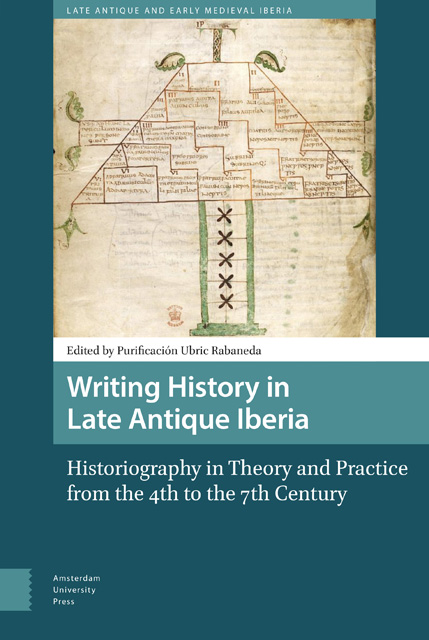 Writing History in Late Antique Iberia
Writing History in Late Antique Iberia Book contents
- Frontmatter
- Table of Contents
- 1 Writing History in Late Antique Iberia: Theory and Praxis
- 2 Para qué sirve la Historia : Principios teóricos de la historiografía hispana tardoantigua
- 3 From Christian Historiography to the Emergence of National Histories : Spanish Historiography between Romans and Visigoths
- 4 Orosius: An Iberian Patriot’s History of Rome
- 5 Orosius, Barbarians, and the Christian Success Story
- 6 Prophecies and Omens of the Fall of the Roman Empire in the Chronicle of Hydatius of Lemica
- 7 La dimensión política de los historiadores del reino visigodo de Toledo
- 8 The Definitions and Uses of Historia in Isidore of Seville
- 9 Bishops and Their Biographers : The Praxis of History Writing in Visigothic Iberia
- 10 Local Powers and Construction of the Past in the Visigothic Kingdom of Hispania
- 11 The Contemplation of the Past in the Libellus Precum of Faustinus (and Marcellinus)
- 12 Orthodoxy and Heterodoxy : The Historiography of Hispania in Late Antiquity
- 13 Expulsados de la Historia : El argumento histórico en la polémica antijudía hispana (siglos IV-VII)
- 14 Consideraciones sobre la temporalidad en las Vitae Sanctorum visigóticas
- 15 The Image of Leovigild as Arian Monarch in the ‘Vitas Patrum Emeritensium’ : From Historical Reality to Hagiographical Deformation
- Index
10 - Local Powers and Construction of the Past in the Visigothic Kingdom of Hispania
Published online by Cambridge University Press: 18 April 2023
- Frontmatter
- Table of Contents
- 1 Writing History in Late Antique Iberia: Theory and Praxis
- 2 Para qué sirve la Historia : Principios teóricos de la historiografía hispana tardoantigua
- 3 From Christian Historiography to the Emergence of National Histories : Spanish Historiography between Romans and Visigoths
- 4 Orosius: An Iberian Patriot’s History of Rome
- 5 Orosius, Barbarians, and the Christian Success Story
- 6 Prophecies and Omens of the Fall of the Roman Empire in the Chronicle of Hydatius of Lemica
- 7 La dimensión política de los historiadores del reino visigodo de Toledo
- 8 The Definitions and Uses of Historia in Isidore of Seville
- 9 Bishops and Their Biographers : The Praxis of History Writing in Visigothic Iberia
- 10 Local Powers and Construction of the Past in the Visigothic Kingdom of Hispania
- 11 The Contemplation of the Past in the Libellus Precum of Faustinus (and Marcellinus)
- 12 Orthodoxy and Heterodoxy : The Historiography of Hispania in Late Antiquity
- 13 Expulsados de la Historia : El argumento histórico en la polémica antijudía hispana (siglos IV-VII)
- 14 Consideraciones sobre la temporalidad en las Vitae Sanctorum visigóticas
- 15 The Image of Leovigild as Arian Monarch in the ‘Vitas Patrum Emeritensium’ : From Historical Reality to Hagiographical Deformation
- Index
Summary
Abstract
This chapter examines how conflict between central and local powers was portrayed in the construction of the Visigothic kingdom’s past, focusing on two of the most illustrious authors of the kingdom’s ideological historical narrative, John of Biclar and Isidore of Seville. The aim is to show that the lists of the Gothic kings’ military campaigns against local powers should not be viewed as a mere inventory, but rather as a very specific ideological project that is also apparent in an analysis of the lexicon employed.
Keywords: Local powers, Construction of the past, Visigothic Iberia, Historiography
The triumph of a linear, providentialist, and teleological history, forged by authors such as John of Biclaro and Isidore of Seville in the Visigothic Kingdom of Toledo could prompt equally linear readings of its content. This chapter examines how John and Isidore – the principal narrative sources in the construction of the Visigothic past – portrayed relations between central and local powers with a particular focus on the lexicon of conquest. This does not necessarily imply a rigid vision between centre and periphery, but rather an exploration of the role that these relations played in the construction of a linear history by clerics, monks, and bishops in seventh-century Hispania.
Consolidation of the Visigothic Kingdom in Hispania
Recent research has undoubtedly demonstrated that consolidation of the Visigothic Kingdom in Hispania did not occur through a linear process of conquest. As we shall see below, while it is true that dominion was sometimes achieved through military conquest in the strict sense of the word, it is no less true that these conquests formed the basis of more complex processes related to negotiated – and sometimes imposed – mechanisms such as taxation, administration, and pacts with the Catholic Church, aspects that are beyond the scope of this chapter but which form the backdrop to the subject under study.
The Goths, who from the time of Cassiodorus, Jordanes, and Procopius of Caesarea came to be known as Visigoths in the sources, formed their kingdom in Hispania in gradual stages. Their defeat at the hands of the Franks at Vouillé (507) undoubtedly represented a turning point, but was not the only reason why the Visigoths settled in Hispania.
- Type
- Chapter
- Information
- Writing History in Late Antique IberiaHistoriography in Theory and Practice from the 4th to the 7th Century, pp. 181 - 200Publisher: Amsterdam University PressPrint publication year: 2022
